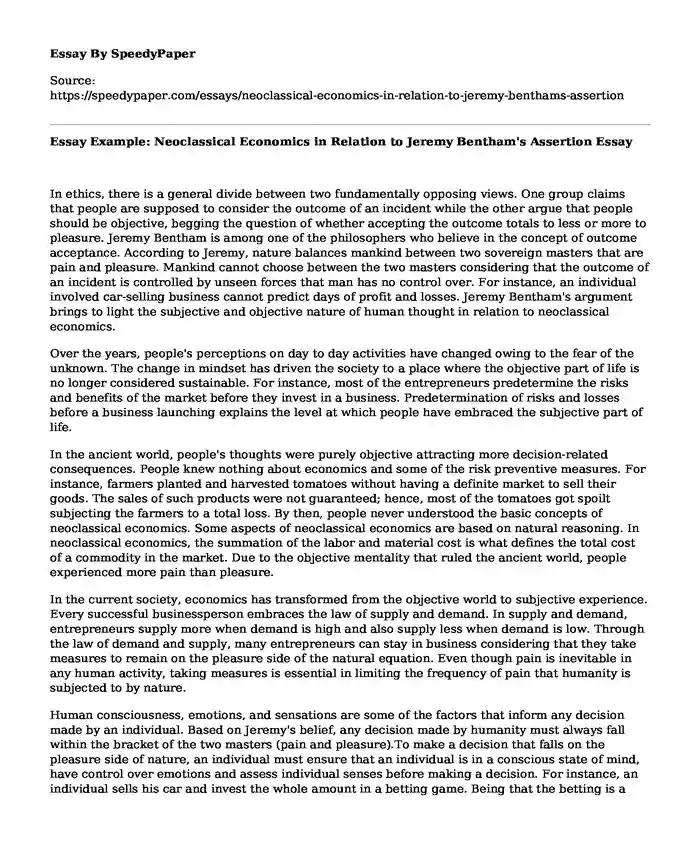
| Type of paper: | Essay |
| Categories: | Ethics Philosophers |
| Pages: | 4 |
| Wordcount: | 827 words |
In ethics, there is a general divide between two fundamentally opposing views. One group claims that people are supposed to consider the outcome of an incident while the other argue that people should be objective, begging the question of whether accepting the outcome totals to less or more to pleasure. Jeremy Bentham is among one of the philosophers who believe in the concept of outcome acceptance. According to Jeremy, nature balances mankind between two sovereign masters that are pain and pleasure. Mankind cannot choose between the two masters considering that the outcome of an incident is controlled by unseen forces that man has no control over. For instance, an individual involved car-selling business cannot predict days of profit and losses. Jeremy Bentham's argument brings to light the subjective and objective nature of human thought in relation to neoclassical economics.
Over the years, people's perceptions on day to day activities have changed owing to the fear of the unknown. The change in mindset has driven the society to a place where the objective part of life is no longer considered sustainable. For instance, most of the entrepreneurs predetermine the risks and benefits of the market before they invest in a business. Predetermination of risks and losses before a business launching explains the level at which people have embraced the subjective part of life.
In the ancient world, people's thoughts were purely objective attracting more decision-related consequences. People knew nothing about economics and some of the risk preventive measures. For instance, farmers planted and harvested tomatoes without having a definite market to sell their goods. The sales of such products were not guaranteed; hence, most of the tomatoes got spoilt subjecting the farmers to a total loss. By then, people never understood the basic concepts of neoclassical economics. Some aspects of neoclassical economics are based on natural reasoning. In neoclassical economics, the summation of the labor and material cost is what defines the total cost of a commodity in the market. Due to the objective mentality that ruled the ancient world, people experienced more pain than pleasure.
In the current society, economics has transformed from the objective world to subjective experience. Every successful businessperson embraces the law of supply and demand. In supply and demand, entrepreneurs supply more when demand is high and also supply less when demand is low. Through the law of demand and supply, many entrepreneurs can stay in business considering that they take measures to remain on the pleasure side of the natural equation. Even though pain is inevitable in any human activity, taking measures is essential in limiting the frequency of pain that humanity is subjected to by nature.
Human consciousness, emotions, and sensations are some of the factors that inform any decision made by an individual. Based on Jeremy's belief, any decision made by humanity must always fall within the bracket of the two masters (pain and pleasure).To make a decision that falls on the pleasure side of nature, an individual must ensure that an individual is in a conscious state of mind, have control over emotions and assess individual senses before making a decision. For instance, an individual sells his car and invest the whole amount in a betting game. Being that the betting is a game that has luck by chance, the possibility of losing the money is high as compared to winning. In this case, the investor based his perception on the objective world and could end up in pains due to the loss. Although objectivity applies in other aspects of life, it is the major reason people experience pain. Those who focus on the subjective always fall on the pleasure side, especially the businessmen.
Neoclassical and classical economics aided the development of management thoughts. Organizations gave much attention to job and machines. In neoclassical economics, productions are increased based on understanding people. According to Bentham's concept of subjective utility determines the value of a commodity or service. Being that all business decisions have negative and positive consequences, the best perfection should be subjective rather than objectives. All the risk control processes are embedded in the subjective experience.
A personal evaluation is important in life considering that mankind is governed by pain and pleasure. The ability to make decision determines an individual's master. Some people may fall into the bracket of pain while other serves the master of pleasure. Jeremy's philosophical reasoning about the people's well-being is justified. He takes on the subjective to be the ideal form of natural perception that an individual should adopt. Apart from Jeremy's take, many businesses in the contemporary world are successful because they apply subjective reasoning to any business decision. Neoclassical economics also bases its concepts on subjective reasoning. The objective rationale can only be used in other aspects of life where the impacts of risks are insignificant. Although people may also incur losses because of the subjective mind, it remains the best form of perception that an individual can possess.
Cite this page
Essay Example: Neoclassical Economics in Relation to Jeremy Bentham's Assertion. (2022, Oct 24). Retrieved from https://speedypaper.com/essays/neoclassical-economics-in-relation-to-jeremy-benthams-assertion
Request Removal
If you are the original author of this essay and no longer wish to have it published on the SpeedyPaper website, please click below to request its removal:
- A Time for Choosing - Free Essay on the Speech of Ronald Reagan
- Free Essay on Revising Canon four of the Code of Ethics for Engineers
- The Left Hand of Darkness, Literary Essay Sample
- Ethics Essay Example: All Abortions Are Selfish
- Free Essay Sample - Teju Cole's 'Open City' Response
- Free Essay Example. Perspectives in History
- Essay Sample on Provision of Transportation Choices: King Farm
Popular categories




